

Niagara College
Canada’s leader in applied, experiential learning, NC offers its students a breadth of programs that reflect and respond to the key sectors of our region, our province and the broader global economy.
These programs immerse students within a highly experiential learning environment, enhanced by digital technologies. Our graduates possess cultural and global competencies; they are innovative, adaptable and entrepreneurial, pushing the boundaries of the possible for industry in Niagara, in Canada and abroad.
Niagara College acknowledges that we are gathered on the shared traditional lands of the Anishinaabe (pronounced: ah-nish-naw-bay) and Haudenosaunee (pronounced: ho-deh-neh-show-nee). We offer our sincere gratitude to them as the stewards of this land, which is protected by the Dish With One Spoon Wampum agreement’s three principles: to take only what you need, leave enough for others, and always keep the dish clean. Today, many First Nations, Métis, and Inuit communities from across Turtle Island continue to live and work in this territory. Acknowledging the peoples whose territory we are on, and the agreements that guide their stewardship of the land, reminds us to reflect on and respect their unique relationship to this land. It also is an invitation for all of us to identify and engage in actions that respect and reinforce our commitments to Truth and Reconciliation and Indigenous Rights.


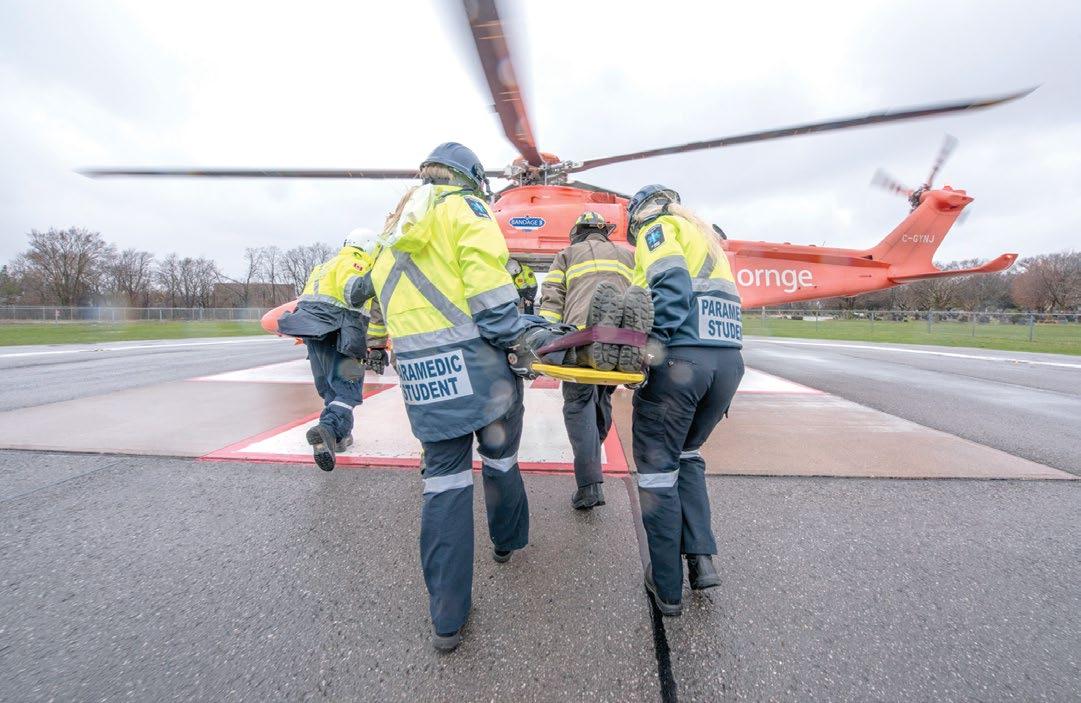
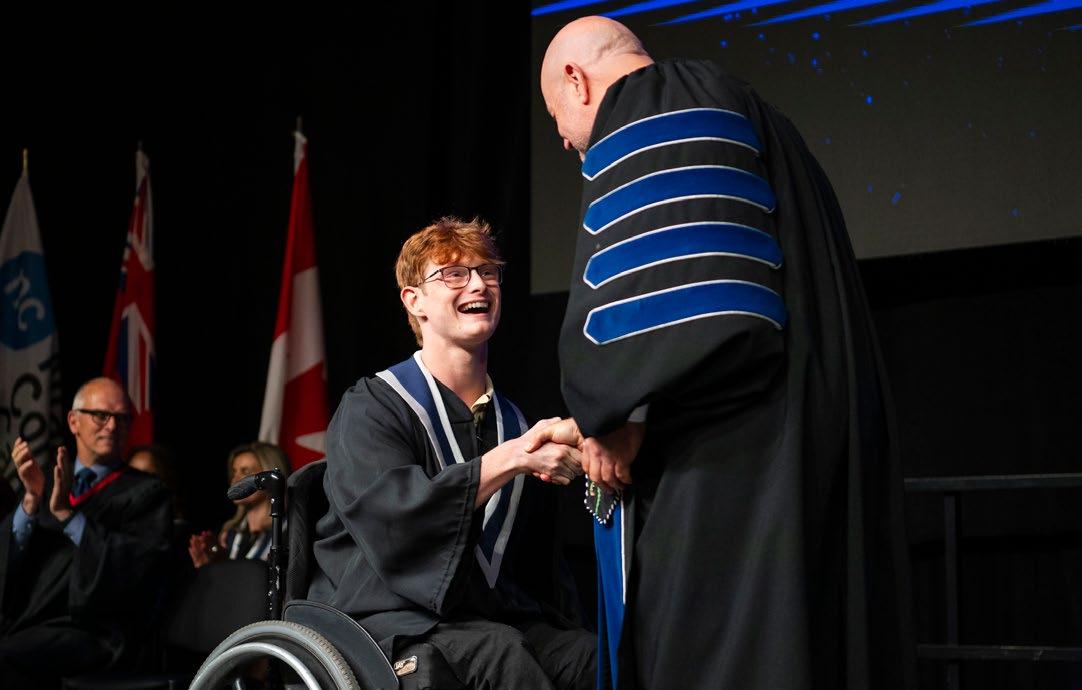


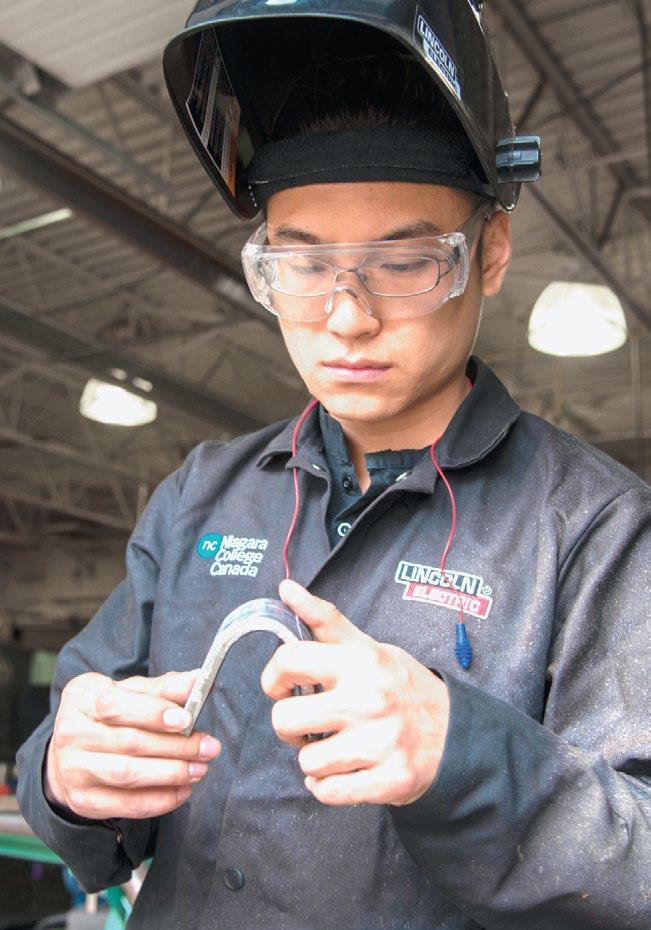
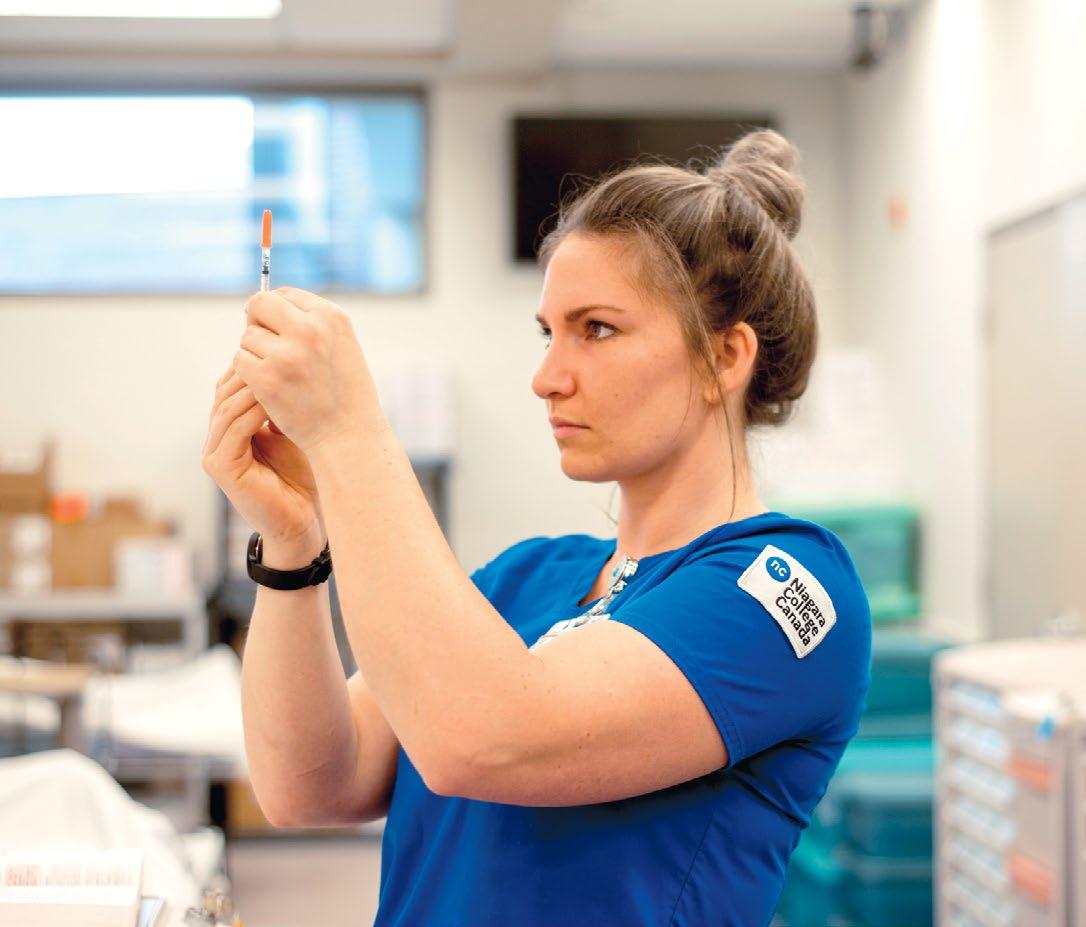
New York State
NIAGARA ON-THE-LAKE CAMPUS
WELLAND CAMPUS

Welcome to Niagara
Located in the heart of the Niagara Region – just minutes from one of the world’s most well-known tourism destinations with events, shows and festivals happening daily – Niagara College (NC) offers more than 130 innovative programs housed between our campuses in Welland and Niagara-on-the Lake. Together, they provide unique living labs and state-of-the-art facilities that deliver experiential learning opportunities; numerous on-campus employment opportunities; world-class applied research; and smaller class sizes delivered in an intimate and welcoming environment.
With close proximity to restaurants, wineries, museums, galleries, live music, festivals and only a 30-minute drive to the Canada-US border, both campuses are known for their warm and supportive culture and commitment to offering relevant programs that provide real-world work experience. Our classes are taught by passionate faculty who are committed to student success, resulting in a truly, one-ofa-kind educational experience.

Getting Here
No matter which direction you are travelling from, the Welland Campus (WC) and the Daniel J. Patterson Campus in Niagara-on-the-Lake (NL) are easy to get to thanks to the transportation corridor and vast network of highways which connect Niagara to Canada’s largest city and the most populous regions of the USA.
Located in Welland’s residential district, a strong reflection of our commitment to supporting the local communities we serve, the Welland Campus is a 90-minute drive to the Greater Toronto Area (GTA) and 2 hours to downtown Toronto. The beautiful 125-acre Daniel J. Patterson Campus in Niagara-on-the-Lake which sits at the foot of the Niagara Escarpment, is just a 70-minute drive to the GTA and 90-minutes to downtown Toronto.
Driving times:
Hamilton – 45 minutes
Oakville – 55 minutes
Milton – 60 minutes
Brantford – 60 minutes
Mississauga – 60 minutes

The Niagara Transit Commission serves all of the municipalities in the region and will ensure you get where you need to go. For routes and schedules visit nrtransit.ca
In addition, for students travelling to Niagara, GO Transit provides daily service directly to NC’s Daniel J. Patterson Campus in Niagara-on-the-Lake with route details available at niagaracollege.ca/GO

Welland Campus

There is plenty to experience at the Welland Campus which has seen a complete overhaul in the past 10 years with expansions, additions and renovations to every section of the facility. The original home of NC, this campus is a leader in sustainable technology and operates state-of-the-art, modern learning environments designed to help students succeed in their education and career training.
The Welland Campus is located in the heart of a residential area near shopping centres and a variety of food outlets. The Seaway Mall and Niagara Street (shopping and food) are within walking distance of the campus. Transit connections via Niagara Regional Transit are available from the college, or from bus stops close-by.
Niagara Falls, one of the wonders of the natural world, is only 25 minutes away by car. The beautiful Niagara Parkway, Niagara River, and Ontario Wine Country are within driving distance as well. Sand beaches and summertime fun are at your fingertips – visit the north shore of Lake Erie, one of Ontario’s Great Lakes. Known as Ontario’s “South Coast”, the shore area offers swimming, fishing, boating, hiking, festivals and more, and is only a brief car ride away.
Academic Schools:
Academic and Liberal Studies
Allied Health
Community Services
English Language Studies
Justice and Fitness
Media
Nursing and Personal Support Worker
Part-Time Studies
Technology
Trades
Campus Highlights:
Applied Health Institute
Dental Clinic
Eva M. Lewis Library and Learning Commons
Green Automotive Technology Lab
Marilyn I. Walker Centre of Excellence in Visual Arts and Technology
Massage Therapy Clinic
Rankin Technology Centre
Research and Innovation
Simplii Financial Athletic Centre
Teaching Hair Salon
Walker Advanced Manufacturing Innovation Centre


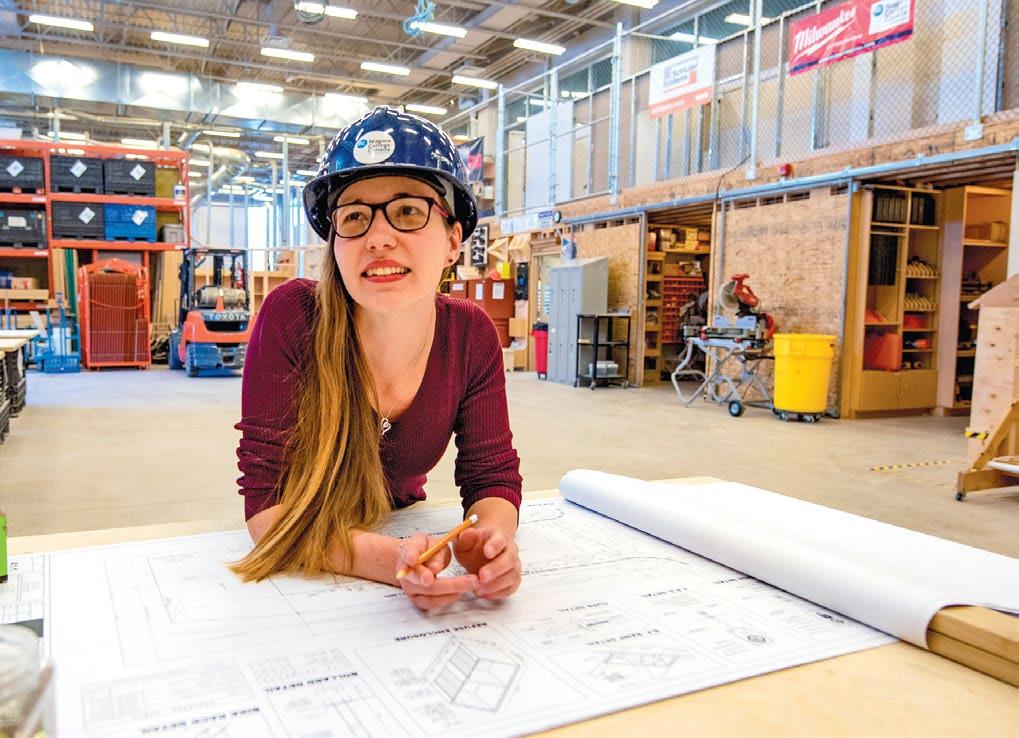

Niagara on-theLake Campus

The 125-acre Daniel J. Patterson Campus in Niagaraon-the-Lake is the centre for NC’s business, hospitality, horticultural, environmental, culinary, wine, beer and spirits programs. It has blossomed into a masterpiece of handson learning through the innovative development of several on-campus teaching enterprises. It has recently seen the addition of a state-of-the-art fitness and research centre in the Marotta Family Innovation Complex, Canada’s first and only Cannabis Institute and the NC Teaching Distillery.
Students and visitors alike can enjoy two worlds: the natural landscape of the Niagara escarpment situated adjacent to the campus and the lively surrounding communities. There is something for everyone, including a 100+ brand outlet shopping centre across the street.
Niagara Falls and the beautiful Niagara Parkway, Niagara River, and Ontario Wine Country are all close by. Students and residents can also visit beautiful sand beaches and enjoy summertime fun along the shores of Lake Erie and Lake Ontario. The Niagara area also offers excellent recreational fishing, boating, hiking, as well as vibrant festivals and events all year round.
Academic Schools:
Academic and Liberal Studies
Business and Management
Culinary Arts
Environment and Horticulture
Hospitality and Tourism
Wine, Beer and Spirits Studies
Campus Highlights:
40-Acre Vineyard
Benchmark Restaurant
Cannabis Institute
Ecological Lagoons and Wetlands
Marotta Family Innovation Complex
Pop-up Culinary, Wine, Beer and Spirits events
Research and Innovation
Simplii Financial Fitness and Recreation Centre
Teaching Brewery
Teaching Distillery
Teaching Greenhouse
Teaching Spa
Teaching Winery
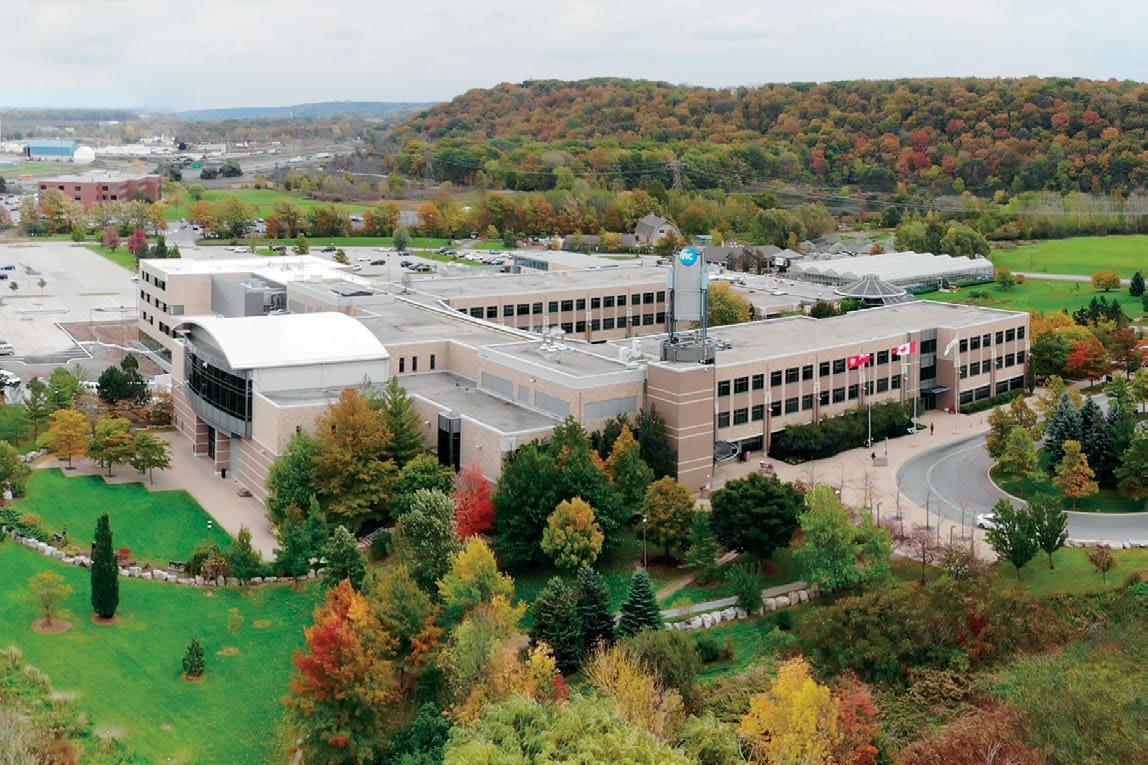


Trades Studies
Carpentry and Renovation Technician (Co-op)
Carpentry and Renovation Techniques
Electrical Techniques
Hairstyling
Hairstyling–Barbering*
Mechanical Techniques (General Machinist)
Motive Power Technician–Automotive (Co-op)
Motive Power Techniques–Automotive
Welding Technician
Welding Techniques
Apprenticeship Programs
Automotive Service Technician
Electrician–Construction and Maintenance
General Carpenter
General Machinist
Hairstylist
Industrial Electrician
Industrial Mechanic Millwright
Metal Fabricator (Fitter)
Welder
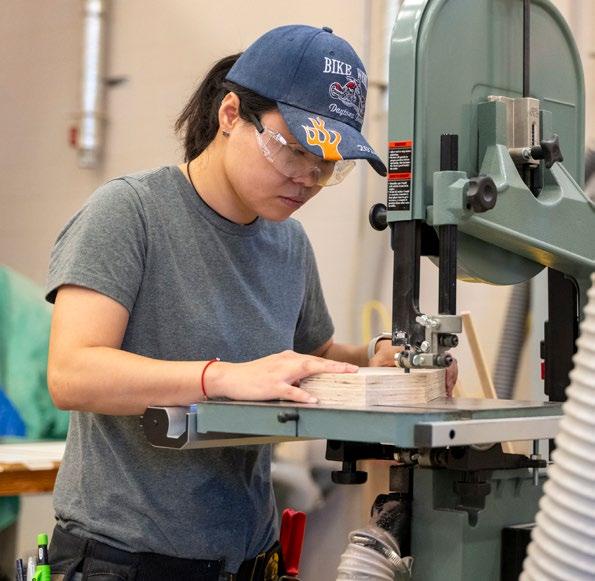



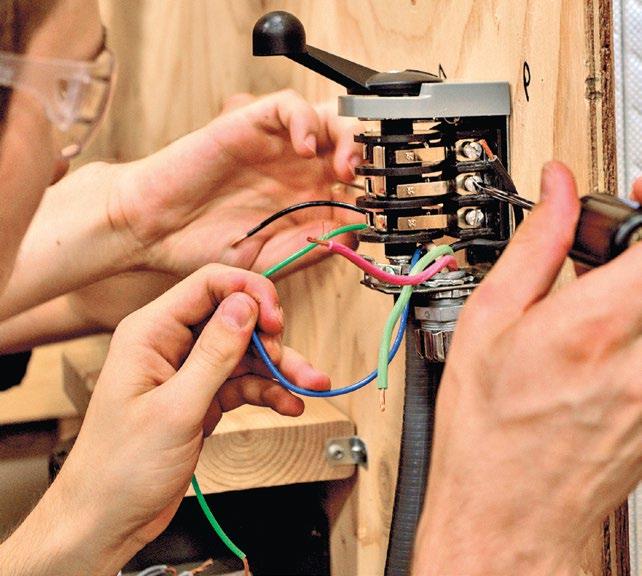

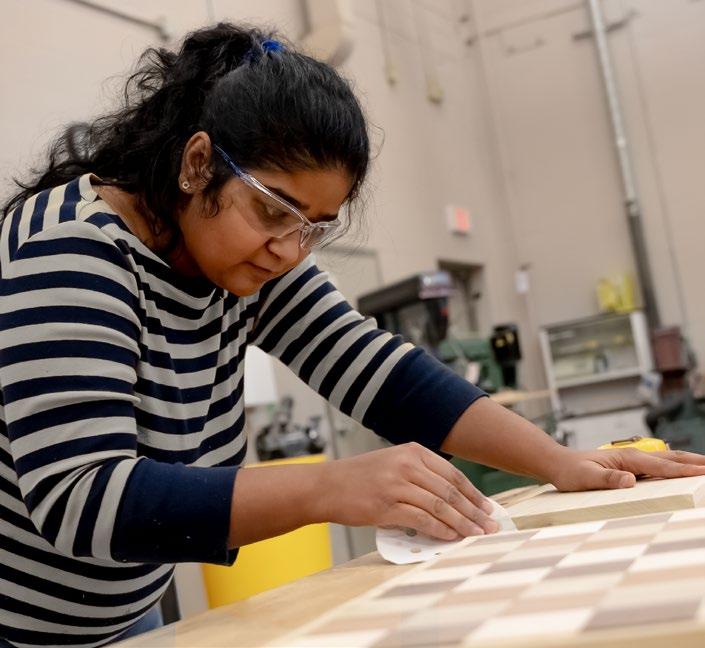

Admission Requirements:
The School of Trades prepares students for the workforce or future study in a wide variety of skilled trades.
Aligned with NC’s commitment to helping meet Ontario’s demand for well-trained, highly-skilled workers, the college’s trades programs are taught by expert faculty in spacious lab facilities with modern equipment, enabling students to gain hands-on, applied learning
experiences. In addition, students can further their industry experience by connecting with industry leaders and gaining practical experience via co-op opportunities and apply for additional industryrecognized certifications post-graduation. niagaracollege.ca/
Recommended Courses: Construction Technology 11 or 12 (C), Math 12 (C)or(U), Technological Design 11 or 12 (M).
12 (C)or(U), Math 11 (C),(U)or(M). Recommended Courses: Math 12 (C)or(U), Technological Design 11 or 12 (M).
Mechanical Techniques (General Machinist)
F/W/S OSSD, or equivalent, ENG 12 (C)or(U), Math 11 (C),(U)or(M).
Recommended Courses: Math 12 (C)or(U), Manufacturing Engineering Technology
Recommended
Once you have received your “Offer of Classroom Training Letter” from the Ministry of Labour,
Some programs have pre-admission requirements-for details visit niagaracollege.ca/par. For additional program requirements turn to page 123. Recommended Courses or Skills: These courses and skills may help you succeed academically in this program, but they are not required for admission. * This program has a 12 month accelerated delivery with awards a 2 year Ontario College Diploma in Hairstyling
Studies
Carpentry and Renovation Technician
Do you enjoy working with your hands and have an interest in building and improving residential and commercial spaces? As a Carpentry and Renovation Technician, you are well-equipped to safely and efficiently contribute to Ontario’s growing construction and renovation industry.
Program Highlights:
› High demand for graduates due to a chronic shortage of skilled trades workers in the construction industry.
› Critical knowledge and hands-on learning of project planning including estimating, management and delivery of a renovation project.
› Connect with industry leaders and gain practice experience via a co-op work term.
› Common first-year curriculum with Niagara College’s Carpentry and Renovation Techniques certificate program.
Career Opportunities:
› Carpenter apprentice
› Commercial construction
› Commercial and residential building restoration specialist
› Commercial formwork carpenter
› Custom home builder
› Drywall installer
› Exterior siding installer
› Finish carpenter
› Fence, deck and drywall business owner
› Insulation installer
› Lumberyard sales representative
› Maintenance carpenter
› Renovation carpenter
› Residential framing carpenter
› Roofer renovation specialist
› Project manager
› Supplier for retail building centres and lumberyards
Carpentry and Renovation Techniques
Are you interested in learning the skills needed to create or enhance buildings and structures? As a Carpentry and Renovation Techniques graduate, you have the practical skills needed to play a key role in the rapidly growing construction industry.
Program Highlights:
› Gain knowledge of building construction, tools and techniques, surveying and building layout, building codes, health and safety, residential estimating, and more.
› High demand for graduates due to a chronic shortage of skilled trades workers in the construction industry.
› Graduates choose between workforce entry and pursuing their studies with Niagara College’s Carpentry and Renovation Technician (Co-op) program.
› Common first year with Carpentry and Renovation Technician (Co-op) program.
Career Opportunities:
› Carpenter apprentice
› Commercial formwork carpenter
› Drywall installer
› Exterior siding installer
› Finish carpenter
› Insulation installer
› Lumberyard sales representative
› Maintenance carpenter
› Renovation carpenter
› Residential framing carpenter
› Roofer
TERM COURSE TITLE
ONE
Computer Applications
Blueprint Reading for Construction Trades
Building Construction I
Construction Materials I
Applied Technical Mathematics for Construction Trades
Health and Safety
Construction Tools and Techniques
TWO Building Codes and Specifications
Building Construction III: Building Exteriors
Construction Surveying and Building Layout
Residential Estimating
Building Construction IV: Trims and Finishes
Essentials of Workplace Communication
Building Construction II
THREE Co-op Work Term
FOUR CAD for the Building Trades
Entrepreneurship
Construction Renovation Project (Management)
Building Codes II
Building Construction V: Structural Modifications
Introduction to Interior Design
Architectural Millwork
FIVE Commercial Construction Methods
Construction Materials II
Green Building Practices
Architectural Styles
Mechanical Electrical Design and Installation
Construction Renovation Project (Practical)
General Education Elective (1 course required)
TERM COURSE TITLE
ONE
Computer Applications
Blueprint Reading for Construction Trades
Building Construction I
Construction Materials I
Applied Technical Mathematics for Construction Trades
Health and Safety
Construction Tools and Techniques
TWO Building Codes and Specifications
Building Construction II
Building Construction III: Building Exteriors
Construction Surveying and Building Layout
Building Construction IV: Trims and Finishes
Residential Estimating Essentials of Workplace Communication
Electrical Techniques
Do you enjoy working with your hands and have a desire to help meet the demand for skilled electrical workers in Ontario? As an Electrical Techniques graduate, you have the fundamental electrical skills needed and advanced knowledge necessary for workforce entry and a strong foundation for further study in the electrical field.
Program Highlights:
› Learn from highly experienced and supportive faculty who are experts in their fields.
› Modern equipment and spacious lab facilities provide an optimal, applied learning experience.
› Demand for graduates is high in the Niagara Region and throughout Ontario.
Career Opportunities:
› Electrical construction and maintenance apprentice
› Fire alarm technician
› Independent contractor
› Industrial electrician apprentice
› Network cabling technician
› Related mechanical tradesperson
› Service technician
Hairstyling
Do you enjoy making people feel good about themselves and want to apply your passion for helping and artistic flair to a career in hairstyling? As a Hairstyling graduate, you are qualified for entry into a hairstyling apprenticeship leading to a rewarding career helping clients look and feel their best.
Program Highlights:
› Gain fundamental knowledge of hair design through hands-on learning in current hairstyling labs.
› Work closely with industry employers to learn innovative technical skills and styling trends.
› Learn from experienced faculty who encourage individual creativity.
› Graduates are eligible to register with the Ministry of Labour, Immigration, Training and Skills Development as an apprentice in order to complete on-the-job, in-salon training.
› Completion of the apprenticeship term qualifies graduates to write the Provincial Certificate of Qualification Exam (C of Q) for their Hairstylist Provincial Licence.
Career Opportunities:
› Business owner
› Chemical technician
› Colour technician/specialist
› Hairstylist
› Haircutting technician/specialist
› Product sales representative
› Salon consultant
› Salon manager
› Salon receptionist
TERM COURSE TITLE
ONE Electrical Prints - Residential
Electrical Concepts I
Electrical Installations I
Canadian Electrical Code
Electronic Concepts I
Mathematics for Electrical Trades
Health and Safety
TWO Computer Applications
Essentials of Workplace Communication
Electrical Prints - Commercial and Industrial
Introduction to Electrical Instrumentation
Introduction to Network Cabling
Electrical Concepts II
Electrical Installations II
Electronic Concepts II
LEARNING ENTERPRISE
TERM COURSE TITLE
ONE Essentials of Workplace Communication
Hairstyling and Design I
Scalp and Hair Treatment
Hair Colouring I
Chemical Processing I
Hairstyling and Cutting I
Basic Short Haircuts
Ethics and Professional Practice
TWO Hairstyling and Design II
Understanding Society: Communication Model
Hairstyling and Cutting II
Retailing, Professionalism and Customer Service
Hair Colouring II
Hair Salon Clinic I
General Education Elective (1 course required)
THREE Nails and Makeup Techniques
Hairstyling and Cutting III
Hair Colouring III
Hairstyling and Design III
Hair Salon Clinic II
General Education Elective (2 courses required)
Trades Studies
This program has a 12 month accelerated delivery with awards a 2-year Ontario College Diploma in Hairstyling.
Do you enjoy working with people and are looking for an exciting unique learning experience in a growing field that will allow you to express your artistic flair? As a Hairstyling–Barber graduate, you will have all the foundational learning to allow you to become a licensed Hairstylist in Canada and have the highly sought after unique skills associated with barbering.
Program Highlights:
› Gain fundamental knowledge of hair design through hands-on learning in current hairstyling labs.
› Work closely with industry employers to learn innovative technical skills and styling trends.
› Learn from experienced faculty who encourage individual creativity.
› Graduates are eligible to register with the Ministry of Labour, Immigration, Training and Skills Development as an apprentice in order to complete on-the-job, in-salon training.
› Completion of the apprenticeship term qualifies graduates to write the Provincial Certificate of Qualification Exam (C of Q) for their Hairstylist Provincial Licence.
Career Opportunities:
› Business owner
› Chemical technician
› Colour technician/specialist
› Hairstylist
› Haircutting technician/specialist
› Product sales representative
› Salon consultant
› Salon manager
› Salon receptionist
Mechanical Techniques (General Machinist)
Do you have an interest in becoming a skilled craftsperson with a career in a high-demand machining field? As a General Machinist, you will have the ability to set up and operate a wide variety of precision metal cutting and grinding machines utilized in this growing sector of specialty machining industries.
Program Highlights:
› Program emphasis on building broad-based knowledge and critical problem-solving skills.
› Access hands-on experiential learning opportunities in current, large-scale facilities and labs.
› Strong job prospects due to a shortage of skilled machinists in the Niagara Region and across Ontario.
› Program is continuously updated to meet current industry standards and enable students to develop highly relevant, market-ready skills.
Career Opportunities:
› CNC operator
› General machinist
› Industrial millwright apprentice
› Machine tool builder and integrator
› Mould maker
› Pattern maker
› Quality control technician
› Tool and die maker
TERM COURSE TITLE
ONE Essentials of Workplace Communication
Hairstyling and Design I
Scalp and Hair Treatment
Basic Short Haircuts
Hair Colouring I
Chemical Processing I
Ethics and Professional Practice
Hairstyling and Cutting I
TWO Understanding Society: Communication Model
Hairstyling and Cutting II
Hair Colouring II
Retailing, Professionalism and Customer Service
Hairstyling and Design II
Hair Salon Clinic I
General Education Elective (1 course required)
THREE Facial Grooming
Haircutting and Clipper Techniques
Advanced Hairstyles for Barbers
Advanced Short Haircuts
Barbering Clinic
General Education Elective (2 courses required)
ONE
Trade Calculations
Mechanical Engineering Drawings
Machine Operations and Safety
Machining Fundamentals
Materials and Cutting Tools
Machine Shop Theory and Measurement
TWO Essentials of Workplace Communication
Health and Safety
Machine Operations 1
Machine Operations 2
Computer Numerical Control (CNC) Operation
Machine Shop Theory
Motive Power Technician–Automotive
Are you a problem solver with an interest in how vehicles work and the impact of auto technology on modern-day cars and trucks? As a Motive Power Technician with a focus on the automotive sector, you can choose to operate your own automotive shop or work as an Automotive Service Technician or Parts Manager at an automotive body shop or commercial dealership.
Program Highlights:
› Hands-on, experiential learning opportunities include analyzing and solving complex motive system problems and diagnosing and repairing mechanical, electronic and electrical motive power components and systems.
› Use the latest technical equipment in state-of-the-art labs.
› Gain practical experience using troubleshooting techniques and test equipment to support automotive transportation in a co-op work term.
› Gain exposure to current motive power technology in one-of-a-kind electric vehicle lab.
Career Opportunities:
› Assistant service advisor
› Assistant service manager
› Automotive dismantler
› Automotive service technician
› Automotive service writer
› Installer
TERM COURSE TITLE
ONE Vehicle Body and Structure
Application Fundamentals
Automotive Hydraulics
Engines I
Work Practices and Fabrication
Computer Applications - Automotive
Essentials of Workplace Communication
Applied Technical Mathematics for Motive Power Technicians
TWO Gear Trains
Automotive Electrical Principles I
Suspension and Steering Systems
Braking Systems I
Materials Science
Environmental Controls
Customer Relations
› Parts counter staff
› Technical salesperson
› Shop owner
Motive Power Techniques–Automotive
This program is an excellent starting point for entry into many areas of the automotive field. Graduates will be able to enter directly into many entry level positions in the automotive sector including being set up with solid foundational skills that will help enable them to find an apprenticeship as an Automotive Service Technician.
Program Highlights:
› Program emphasizes hands-on learning.
› State of the art facilities for students’ applied learning experiences.
› Small class sizes where students receive individual attention from the professor.
› More than 3 decades of apprenticeship in-school training experience.
› Graduates who register as Automotive Service Technician apprentices can challenge the level one exam, which can shorten their apprenticeship training time.
Career Opportunities:
› Assistant service manager
› Automotive appraiser
› Automotive service technician
› Automotive service writer
› Lube technician
› Parts person or parts installer
› Technical salesperson
Ontario College Diploma
THREE Co-op Work Term
FOUR Trends in Automotive Technology
Engines II
Braking Systems II
Drive Train Technology I
Vehicle Dynamics
Automotive Electrical Principles II
Power Train Controls
General Education Elective (1 course required)
FIVE Motive Power Operations Management Principles
Diagnostic Principles
Automotive Electronic Accessories
Drive Train Technology II
Auto Control Circuits
Business Communications - Automotive
General Education Elective (1 course required)
Ontario College Certificate
TERM COURSE TITLE
ONE Vehicle Body and Structure
Application Fundamentals
Automotive Hydraulics
Engines I
Work Practices and Fabrication
Computer Applications - Automotive
Essentials of Workplace Communication
Applied Technical Mathematics for Motive Power Technicians
TWO Gear Trains
Automotive Electrical Principles I
Suspension and Steering Systems
Braking Systems I
Materials Science
Environmental Controls
Customer Relations
Trades Studies
Welding Technician
Do you want to make a solid contribution to the structural development of industry facing a shortage of qualified skilled trade workers? As a Welding Technician, you work closely with engineers, are skilled at determining the cutting, fitting and welding sequence, and have a thorough understanding of manufacturing codes and standards across a wide variety of industries.
Program Highlights:
› Hands-on experiential learning in a state-of-the-art, full-size weld shop and fabrication lab, and accredited Canadian Welding Bureau and Technical Standards & Safety Authority test centre facility.
› Gain practical experience taking metal fabrication projects from engineering drawings through cutting and forming stages to welding processes.
› Gain an understanding of industry standard inspection procedures.
› Related program opportunities include Welder Apprenticeship and Metal Fabricator (Fitter) Apprenticeship.
› Common first year with Niagara College Welding Techniques one-year certificate.
Career Opportunities:
› Aviation welding technician
› Brazing machine operator
› Construction welder
› Electric arc welder
› Fabrication estimator
› Gas shielded arc welder
› Maintenance welder
› Manufacturing welder
› Metal fabricator apprentice
› Pipe welder
› Pressure vessel welder
› Production welder
› Quality control inspector
› Shipbuilding welder
› Welder and welder trainee
› Welder fabricator-fitter
› Welder fitter
› Welding product sales associate
Are you interested in working in a high-demand skilled trade and ready to apply some heat to your career? As a Welder, you are well equipped to fuse metal together using a variety of advanced welding techniques with careful precision.
Program Highlights:
› Hands-on experiential learning in a state-of-the-art, full-size weld shop and fabrication lab, and accredited Canadian Welding Bureau and Technical Standards & Safety Authority test-centre facility.
› Gain practical experience taking metal fabrication projects from engineering drawings through cutting and forming stages to welding processes.
› Develop an understanding of industry standard inspection procedures.
› Related program opportunities include Welding Technician, Welder-Apprenticeship and Metal Fabricator (Fitter)-Apprenticeship.
Career Opportunities:
› Construction welder
› Manufacturing welder
› Shipbuilding welder
› Welder and welder trainee
› Welder fabricator-fitter
› Welder fitter
TERM COURSE TITLE
ONE Applied Trade Calculations
Engineering Drawings
Health and Safety
Introduction to Welding and Cutting Processes
Layout and Fabrication
Shielded Metal Arc Welding - Flat Applications
TWO Computer Applications
Essentials of Workplace Communication
Mechanical Repair Technologies
Introduction to Semi Automatic Welding Processes
Weld Applications - Horizontal and Vertical
Weld Quality
THREE Mechanical Engineering Drawings II
Welding Inspection, Codes and Standards
Layout and Fabrication II
Distortion and Metallurgy
Rigging and Construction
Shielded Metal Arc Welding III
General Education Elective (1 course required)
FOUR Destructive and Non-Destructive Examination
Pipe and Pressure Vessel Welding
Semi Automatic Welding Processes II
Gas Tungsten Arc Welding
General Education Elective (2 courses required)
ONE Applied Trade Calculations
Engineering Drawings
Health and Safety
Introduction to Welding and Cutting Processes
Layout and Fabrication
Shielded Metal Arc Welding - Flat Applications TWO Computer Applications
Essentials of Workplace Communication
Mechanical Repair Technologies
Introduction to Semi Automatic Welding Processes
Weld Applications - Horizontal and Vertical
Weld Quality
Automotive Service Technician
Do you have a talent for diagnosing and repairing the sophisticated systems found in today’s motor vehicles and want to turn your ability into a profitable career? As an Automotive Service Technician, you are trained in mechanical diagnostics, cost estimations and customer relations related to a wide range of vehicles and have the skill set required to navigate computerized diagnostic equipment.
Program Highlights:
› Individual student attention as a result of highly experienced, supportive professors and small class sizes.
› State-of-the-art facilities grounded in more than three decades of apprenticeship inschool training experience.
› Graduates can seek provincial certification, a mandatory requirement for employment in this automotive trade, upon program completion.
Career Opportunities:
› Automotive appraiser
› Automotive mechanical installer
› Automotive service technician
› Light-duty service technician
› Motor vehicle inspector and tester
› Parts manager
› Service manager
HOW TO APPLY:
Individuals interested in apprenticeship training need to find a training sponsor or employer willing to engage in apprenticeship training. Once arranged, contact apprenticeship staff at the local Employment Ontario office. An employment and training consultant will arrange a meeting at the workplace to assess the ability of the training sponsor or employer to train and assess the person, prepare the training agreement or contract, and initiate the training.
See page 113 for details or visit niagaracollege. ca/trades
Electrician–Construction and Maintenance
Are you a problem-solver with technical aptitude who wants to be part of the solution to Ontario’s skilled labour shortage? As an Electrician with a focus on construction and maintenance, you have the critical thinking and expertise needed to install and maintain electrical systems in homes and businesses as well as the wiring found in the control equipment of machines used in various industries.
Program Highlights:
› Complete 1050 hours of college instruction and approximately four years of on-the-job training as a paid trainee.
› Individual student attention as a result of highly experienced and supportive professors and small class sizes.
› State-of-the-art facilities and curriculum that combines theoretical knowledge with practical, hands-on training.
› A skilled trades shortage in Ontario combined with a large infrastructure investment by the provincial government has put licensed electricians in high demand.
Career Opportunities:
› Certified fibre optics specialist
› Certified fire alarm specialist
› Construction and maintenance electrician
› Control technician
› Data communications
› Electronics specialist
› Instrument fitter
› Low-voltage repair specialist
› Residential electrical installer
HOW TO APPLY:
Individuals interested in apprenticeship training need to find a training sponsor or employer willing to engage in apprenticeship training. Once arranged, contact apprenticeship staff at the local Employment Ontario office. An employment and training consultant will arrange a meeting at the workplace to assess the ability of the training sponsor or employer to train and assess the person, prepare the training agreement or contract, and initiate the training.
See page 113 for details or visit niagaracollege. ca/trades
TERM COURSE TITLE
ONE Drive Train Systems I
Electrical, Electronic and Emission Systems I
Engine Systems I
Suspension, Steering and Brake Systems I
Work Practices I
TWO Drive Train Systems II
Electrical, Electronic and Emission Systems II
Engine Systems II
Suspension, Steering and Brake Systems II
Work Practices II
THREE Drive Train Systems III
Electrical, Electronic and Emission Systems III
Engine Systems III
Suspension, Steering and Brake Systems III
Work Practices III
TERM COURSE TITLE
ONE Communication and Documentation
Introduction to the Canadian Electrical Code (CEC)
Trade Practices
Installation and Maintenance Methods
Electrical Fundamentals
Drawings, Specifications and Standards Fundamentals
TWO Electrical Systems
Electronic Fundamentals
Drawings, Specifications and Standards Intermediate Motor Controls and Devices
Communication and Monitoring Systems
Canadian Electrical Code II
THREE Renewable Energy Generating and Storage Systems
Electrical Theory and Applications
PLC Fundamentals
Power Electronics
Drawings, Specifications and Standards Advanced
Introduction to Instrumentation
Canadian Electrical Code III
FOUR Building Automation Systems
Professionalism and Ethics
Power Conditioning Systems
Advanced Motors and Generators
High Voltage Service and Operation
Specialty Installations
Canadian Electrical Code IV
Trades Studies
Do you enjoy working with your hands and have a desire to help meet the demands for skilled carpenters in the home building and construction industries? As a General Carpenter, you will have the critical thinking and expertise needed to apply the fundamental rules of building codes to complete construction projects safely and efficiently.
Program Highlights:
› Complete 720 hours of college instruction and approximately four years of on-the-job training as a paid apprentice.
› A skilled trades shortage in Ontario combined with a large infrastructure investment by all levels of government has put licensed General Carpenters in high demand.
› State-of-the-art facilities, equipment and curriculum that combines theoretical knowledge with practical hands-on training to reinforce program concepts.
› Small class sizes allow for increased exposure to the use of equipment and individual instruction from our highly qualified instructors.
Career Opportunities:
› Custom home builder
› General carpenter
› General contractor
› Project manager
HOW TO APPLY:
Individuals interested in apprenticeship training need to find a training sponsor or employer willing to engage in apprenticeship training. Once arranged, contact apprenticeship staff at the local Employment Ontario office. An employment and training consultant will arrange a meeting at the workplace to assess the ability of the training sponsor or employer to train and assess the person, prepare the training agreement or contract, and initiate the training.
See page 113 for details or visit niagaracollege. ca/trades
TERM COURSE TITLE
ONE Safety, Materials and Tools
Plans, Specifications and Codes 1
Residential Estimating, Calculation & Layout 1
Welding Basic Oxy-Acetylene & SMAW
TWO Residential Construction
Plans, Specifications and Codes 2
Estimating, Calculation & Layout 2
THREE ICI Construction Plans, Specifications and Codes 3
Estimating, Calculation and Layout 3
Do you have an aptitude for precision and an interest becoming a skilled craftsperson with the ability to cut and grind materials for use in machinery and equipment? As a General Machinist, you set up and operate a variety of machine tools to cut or grind metal, plastic or other materials to make or modify parts and products with precise dimensions.
Program Highlights:
› Complete 720 hours of college instruction on all aspects of general machining and approximately four years of on-the-job training as a paid trainee.
› Individual student attention as a result of highly experienced and supportive professors and small class sizes.
› State-of-the-art facilities and curriculum grounded in three decades of apprenticeship in-school training.
› Graduates can seek provincial certification and pursue employment in machinery, equipment, motor vehicle, automotive parts, aircraft and other metal products manufacturing companies and machine shops.
Career Opportunities:
› Computerized numeric control machinist/operator
› General machinist
› Machine repair
HOW TO APPLY:
Individuals interested in apprenticeship training need to find a training sponsor or employer willing to engage in apprenticeship training. Once arranged, contact apprenticeship staff at the local Employment Ontario office. An employment and training consultant will arrange a meeting at the workplace to assess the ability of the training sponsor or employer to train and assess the person, prepare the training agreement or contract, and initiate the training.
See page 113 for details or visit niagaracollege.ca/ trades
TERM COURSE TITLE
ONE Trade Theory I
Trade Practical I
Applied Trade Calculations I
Engineering Drawings I
TWO CNC Turning Technology
Trade Theory II
Trade Practical II
Applied Trade Calculations II
Engineering Drawings II
THREE Machining Centre CNC Technology
Trade Theory III
Trade Practical III
Applied Trade Calculations III
Engineering Drawings III
Are you an artistic person who thrives on helping others look and feel their best? As a Hairstylist, you are skilled in the latest hairstyling techniques with a strong understanding of health and safety considerations, client management and the role of entrepreneurship in the beauty industry.
Program Highlights:
› Complete 480 hours of college instruction over a two-year period.
› Many apprentices and graduates winning Skills Canada Awards at the provincial, national and international levels along with ABA, Contessa and Mirror awards.
› Individual student attention as a result of supportive professors, who are highly respected in the hairstyling profession, and small class sizes.
› Hands-on training in up-to-date facilities.
› Graduates can seek provincial certification and pursue employment in hairstyling or hairdressing at salons, barbershops, vocational schools, healthcare establishments and theatre, film and television institutions.
Career Opportunities:
› Business owner
› Chemical technician
› Colour technician/specialist
› Educator
› Hairstylist
› Hair receptionist
› Product sales representative
› Salon consultant
› Salon manager
HOW TO APPLY:
Individuals interested in apprenticeship training need to find a training sponsor or employer willing to engage in apprenticeship training. Once arranged, contact apprenticeship staff at the local Employment Ontario office. An employment and training consultant will arrange a meeting at the workplace to assess the ability of the training sponsor or employer to train and assess the person, prepare the training agreement or contract, and initiate the training.
See page 113 for details or visit niagaracollege. ca/trades
Industrial Electrician
Are you a problem-solver with a technical and mechanical aptitude who wants to use skills and knowledge to find solutions? As an Industrial Maintenance Electrician, you will put your skills and abilities to the test daily by troubleshooting and repairing the equipment used in industry today.
Program Highlights:
› Complete 1050 hours of college instruction and approximately four years of on-the-job training as a paid apprentice.
› A skilled trades shortage in Ontario combined with a large infrastructure investment by all levels of government has put licensed Industrial Maintenance Electricians in high demand.
› State-of-the-art facilities, equipment and curriculum that combines theoretical knowledge with practical hands-on training to reinforce program concepts.
› Small class sizes allow for increased exposure to the use of equipment and individual instruction from our highly qualified instructors.
Career Opportunities:
› Industrial maintenance electrician
› Maintenance supervisor
› Service technician
HOW TO APPLY:
Individuals interested in apprenticeship training need to find a training sponsor or employer willing to engage in apprenticeship training. Once arranged, contact apprenticeship staff at the local Employment Ontario office. An employment and training consultant will arrange a meeting at the workplace to assess the ability of the training sponsor or employer to train and assess the person, prepare the training agreement or contract, and initiate the training.
See page 113 for details or visit niagaracollege. ca/trades
TERM COURSE TITLE
ONE Ethics, Regulation and Policy
Health and Safety
Entrepreneurial Skills 1
Professional Development
Client Service
Preparatory Procedures and Treatments 1
Cut Hair 1
Style Hair 1
Permanent Wave Hair
Colour and Lighten Hair 1
TWO Entrepreneurial Skills 2
Hair Additions
Preparatory Procedures and Treatments 2
Cut Hair 2
Style Hair 2
Chemically Relax Hair
Colour and Lighten Hair 2
ONE
Communication and Documentation
Introduction to the Canadian Electrical Code (CEC)
Trade Practices
Installation and Maintenance Methods
Electrical Fundamentals
Drawings, Specifications and Standards Fundamentals
TWO Electrical Systems
Electronic Fundamentals
Drawings, Specifications and Standards Intermediate Motor Controls and Devices
Communication and Monitoring Systems
Canadian Electrical Code II
THREE Renewable Energy Generating and Storage Systems
Electrical Theory and Applications
PLC Fundamentals
Power Electronics
Drawings, Specifications and Standards Advanced Introduction to Instrumentation
Canadian Electrical Code III
FOUR Building Automation Systems
Professionalism and Ethics
Power Conditioning Systems
Advanced Motors and Generators
Advanced Instrumentation
Pneumatic and Hydraulic Control Systems
High Voltage Service and Operation
Automated Control Systems
Trades Studies
Industrial Mechanic Millwright
Do you have a strong mechanical aptitude and an interest in machinery and heavy equipment? As an Industrial Mechanic Millwright, you will work on all sorts of rotating, hydraulic, and pneumatic equipment. Tasks will include moving, installing, troubleshooting and repairing complex mechanical systems in today’s dynamic manufacturing industry.
Program Highlights:
› Complete 720 hours of college instruction and approximately four years of on-the-job training as a paid apprentice.
› A skilled trades shortage in Ontario combined with a shift in manufacturing to more automation has put licensed Industrial Mechanic Millwrights in high demand.
› State-of-the-art facilities, equipment and curriculum that combines theoretical knowledge with practical hands-on training to reinforce program concepts.
› Small class sizes allow for increased exposure to the use of equipment and individual instruction from our highly qualified instructors.
Career Opportunities:
› Industrial mechanic millwright
› Machine manufacturer
› Maintenance supervisor
› Prime mover technician
HOW TO APPLY:
Individuals interested in apprenticeship training need to find a training sponsor or employer willing to engage in apprenticeship training. Once arranged, contact apprenticeship staff at the local Employment Ontario office. An employment and training consultant will arrange a meeting at the workplace to assess the ability of the training sponsor or employer to train and assess the person, prepare the training agreement or contract, and initiate the training.
See page 113 for details or visit niagaracollege. ca/trades
Metal Fabricator (Fitter)
Do you possess mechanical aptitude and manual dexterity and enjoy seeing the results of your work? As a Metal Fabricator (Fitter) you have the knowledge and expertise needed to design, create, assemble, fit and install steel or other metal components for use in buildings, bridges, tanks, towers, boilers, pressure vessels and other similar structures and products.
Program Highlights:
› Complete 720 hours of college instruction and approximately four years of on-the-job training as a paid trainee.
› State-of-the-art facilities and curriculum that combines theoretical learning with practical, hands-on training that is grounded in three decades of apprenticeship inschool training.
› Individual student attention as a result of supportive professors and small class sizes.
› Graduates can seek employment in a variety of industries including manufacturing, heavy machinery, auto, medical, food, ship building and construction.
Career Opportunities:
› Metal fabricator
› Plater
› Platework fitter
› Shipfitter
› Shipfitter apprentice
› Structural steel fitter
HOW TO APPLY:
Individuals interested in apprenticeship training need to find a training sponsor or employer willing to engage in apprenticeship training. Once arranged, contact apprenticeship staff at the local Employment Ontario office. An employment and training consultant will arrange a meeting at the workplace to assess the ability of the training sponsor or employer to train and assess the person, prepare the training agreement or contract, and initiate the training.
See page 113 for details or visit niagaracollege. ca/trades
TERM COURSE TITLE
ONE Workshop Practice 1
Workshop Technology 1
Machine Technology 1
Rigging and Hoisting
Welding and Fabrication 1
Electrical and Electronic Controls 1
Drawings and Schematics 1
TWO Workshop Practice 2
Power Transmission
Machine Technology 2
Welding and Fabrication 2
Electrical and Electronic Controls 2
Drawings and Schematics 2
THREE Workshop Practice 3
Fluid Power
Machine Technology 3
Welding and Fabrication 3
Electrical and Electronic Controls 3
TERM COURSE TITLE
ONE Trade Practices
Applied Blueprint Reading
Welding Theory
Materials and Process Quality I
Shielded Metal Arc Welding (SMAW)
Gas Shielded Semi-Automatic Welding Practical I
Thermal Cutting
TWO Blueprint - Advanced Fabrication I
Gas Tungsten Arc Welding (GTAW) Practical
Machine Operation
Material and Process Quality II
Pattern and Template Development THREE Fabrication II
Installation
Patterns and Templates Development II
Project Planning
Preparation for Shipping
NOTE: For related apprenticeship opportunities, see Welder Apprenticeship. For postsecondary opportunities, see Welding Techniques and Welding Technician.
Do you have an ability to analyze and solve problems and an interest in working with metal to create the framework for structures used in the construction industry? As a Welder, you have the skill set required to fabricate or sculpt metal using various methods and techniques.
Program Highlights:
› Complete 720 hours of college instruction and approximately four years of on-the-job training as a paid trainee.
› State-of-the-art facilities and curriculum that combines theoretical knowledge with practical, hands-on training and is grounded in three decades of apprenticeship inschool training.
› Individual student attention as a result of supportive professors and small class sizes.
› Graduates can pursue employment in a variety of industries including construction, ship building, mining, pipelines and repairs.
Career Opportunities:
› Aviation welding technician
› Brazing machine setter/operator
› Electric arc welder
› Gas shielded arc welder
› Pressure vessel welder
› Production worker
› Spot welder
› Soldering machine operator
Program Requirements:
COMPUTER
For all postsecondary and graduate programs, students are responsible students are responsible for ensuring that they are in possession of a desktop or laptop computer that meets program-specific requirements noted on the admission requirements section of each program website at niagaracollege.ca/programs. In general and for programs that have no program-specific computer technology requirements, students are responsible for ensuring that they have a Microsoft Windows 10 based desktop or laptop system that meets or exceeds the following general personal computer technology requirements:
• A desktop or laptop system. A system running on an updated Microsoft Windows 10 operating system –minimum 265GB SSD storage and 8 GB memory is recommended, and the college will not be able to provide support for different systems, and any provided software may not operate
properly.
HOW TO APPLY:
Individuals interested in apprenticeship training need to find a training sponsor or employer willing to engage in apprenticeship training. Once arranged, contact apprenticeship staff at the local Employment Ontario office. An employment and training consultant will arrange a meeting at the workplace to assess the ability of the training sponsor or employer to train and assess the person, prepare the training agreement or contract, and initiate the training.
See page 113 for details or visit niagaracollege. ca/trades
• An integrated or peripheral video camera, microphone and speaker system.
• Reliable internet connectivity with broadband capabilities (a minimum download speed of 5 Mbps) is recommended.
Academic software for your courses (supported under the Microsoft Windows 10 operating system) will be made available for download and remote use. Access will also be provided to remote high performance computer labs if software downloads are not feasible.
Programs may move into a laptop learning environment. If a laptop and software become mandatory requirements, students will be notified of the specifications and will be expected to purchase before entering the program.
The reliability of remote connections to college computers and software cannot be guaranteed for Macbook and Chromebook users.
TRANSPORTATION
Students are responsible for their own transportation in order to complete program requirements which may not be readily accessible by public transportation. Program requirements could include co-ops, placements, volunteer requirements, practical labs, field projects, assignments, clinicals, or any other off-campus visits required as part of the program’s curriculum.
OZONE PROTECTION
Students are responsible to complete the Ozone Depletion Potential Certification by the end of Term 2 prior to the co-op term. This is required to repair air conditioning systems.
TERM COURSE TITLE
ONE Trade Practices
Applied Blueprint Reading
Welding Theory
Materials and Process Quality I
Shielded Metal Arc Welding (SMAW)
Gas Shielded Semi-Automatic Welding Practical I
Thermal Cutting
TWO Blueprint Reading, Fitting
Gas Tungsten Arc Welding (GTAW) Practical I
Semi-Automatic Welding Practical II
Shielded Metal Arc Welding (SMAW) Practical II
Welding Theory II
THREE Automatic and Semi-Automatic Processes
Fitting
Gas Tungsten Arc Welding Practicum II, Plasma Arc Welding
Quality
Shielded Metal Arc Welding (SMAW) Practical III
NOTE: For related apprenticeship opportunities, see Metal Fabricator (Fitter) Apprenticeship. For postsecondary opportunities, see Welding Techniques and Welding Technician.
TRADES PROGRAM REQUIREMENTS:
Carpentry and Renovation Technician (Co-op):
Carpentry and Renovation Techniques:
Motive Power Technician–Automotive (Co-op):
For details visit niagaracollege.ca/programs
Some program requirements must be met prior to registration. An offer of admission may be rescinded if the deadline is not met.
How to Apply
Admissions and Applications
Detailed information about Niagara College programs, including admission requirements, can be found online at niagaracollege.ca/programs. Most full-time programs begin in September of each year. Some programs are also available in January or May. Please refer to our program availability list for the current status of each of our programs at niagaracollege.ca/status
MINIMUM ADMISSION REQUIREMENTS :
I AM A DOMESTIC (CANADIAN) APPLICANT:
POSTSECONDARY PROGRAMS:
› Ontario Secondary School Diploma (OSSD), or equivalent.
› English–any Grade 12 (C) or (U), or equivalent. Some programs may admit students with a lesser English requirement. Please see program pages for details or visit niagaracollege.ca/programs
HONOURS BACHELOR’S DEGREE PROGRAMS:
BUSINESS ADMINISTRATION DEGREES:
› Ontario Secondary School Diploma (OSSD), or equivalent
› English–any Grade 12 (U), or equivalent (minimum grade 60%)
› Mathematics–any Grade 12 (U) or Grade 12 Accounting (M), or equivalent (minimum grade 60%)
› Four additional Grade 12 (U) or (M) level courses in any field of study
› An overall average of 65% in the six Grade 12 (U) or (M) courses
NURSING DEGREE:
› English - Grade 12 (U), or equivalent, minimum 75%
› Mathematics - one of MHF4U, MCV4U or MDM4U Grade 12 (U), or equivalent, minimum 75%
› Chemistry - Grade 12 (U), or equivalent, minimum 75%
› Biology - Grade 12 (U), or equivalent, minimum 75%
› Two additional Grade 12 (U) or (M) level courses in any field of study, minimum 60%
› An overall average of 75% in the six required Grade 12 (U) or (M) level courses
› Applicants whose first language is not English must meet specific Bachelor of Science (Nursing) Language Proficiency Requirements. These requirements are as follows: IELTS Overall Band 7.0 (Minimum Band Score of 6.5); TOEFL iBT 100 (Minimum Band Score of 21); TOEFL Paper Based Test 600
NOTE: For all programs, secondary school grades from co-op courses and half credit courses are not considered.
GRADUATE CERTIFICATE PROGRAMS:
› Ontario College Diploma (or equivalent) or Bachelor’s Degree
› Proof of English proficiency
› Most private college courses and/or credentials are NOT acceptable as admission requirements for Niagara College programs. Please contact the admissions office at admissions@niagaracollege.ca for assistance with your particular program of interest.


Applications are available online at ontariocolleges.ca and are subject to a non-refundable application fee.
APPRENTICESHIP PROGRAMS:
› Ontario Secondary School Diploma (OSSD), or equivalent AND › Employment in the trade
For further information, please contact the Ministry of Labour, Immigration, Training and Skills Development, Apprenticeship Client Services: 301 St. Paul St. W, 10th Floor, St. Catharines, ON L2R 7R4 Ph.:905-704-2991 www.ontario.ca/apprenticeship
ADDITIONAL REQUIREMENTS:
The minimum academic requirements listed pertain to most programs. Some programs may also require: specific pre-requisite courses, preadmission testing, attendance at an information session, participation in an audition session, submission of a portfolio, completion of an essay or questionnaire or additional assessment of equivalency to required courses. It is important to note that meeting admission requirements does not guarantee admission to Niagara College programs. You can find specific up-to-date admission requirements as well as selection and ranking information posted on individual program pages at niagaracollege.ca/programs
HOW DO I APPLY AND IS THERE AN APPLICATION FEE?
The application for Canadian citizens, permanent residents, and Convention refugees is available online at ontariocolleges.ca for a nonrefundable application fee. You can apply to a total of five programs, with no more than three choices at any one Ontario college. For more information, please visit ontariocolleges.ca International applicants see below:
I AM AN INTERNATIONAL (VISA) APPLICANT:
Niagara College welcomes students from over 100 different countries. To apply as an international student, you must complete and submit the web application form for International Students, along with your official transcripts from high school and/or university, and provide proof of English Proficiency (if applicable). Upon receiving the information provided, we will assess your application. If you meet the eligibility criteria and the program remains available, you will receive confirmation of your acceptance, accompanied by a request to submit a deposit by a specified deadline. Upon timely submission of the deposit by the deadline, along with meeting the academic requirements, you will receive a Letter of Acceptance, and we will initiate the process of obtaining a Provincial Attestation Letter on your behalf. These documents are essential for your study permit application and cannot be transferred.
INTERNATIONAL APPLICANTS MAY APPLY ONLINE AT: international.niagaracollege.ca/apply
For more information contact:
Niagara College Canada International Division
100 Niagara College Boulevard, Welland, Ontario, Canada, L3C 7L3 Phone: 905-988-2910, ext. 7151 Fax: 905-735-2413
Email: international@niagaracollege.ca
Application Deadlines and Admission Offer Dates
PROGRAM START DATE
Last date to apply for equal consideration to a competitive program
Last date to submit portfolio, test scores and/or final grades in required courses for consideration to competitive programs
SEP 2025 Feb 1, 2025 Feb 28, 2025
JAN 2026 Jun 5, 2025 Jul 10, 2025
MAY 2026 Oct 29, 2025 Nov 19, 2025
HOW WILL I KNOW IF THE COLLEGE HAS RECEIVED MY APPLICATION?
The Admissions Office will send an email and mail an acknowledgement brochure to you after your application has been received from ontariocolleges.ca. The mailing will indicate if there are specific preadmission requirements for the programs for which you have applied and due dates for test scores, portfolio and transcript submissions.
You can also find this information at: niagaracollege.ca/par
ARE ACCOMMODATIONS PROVIDED IN THE ADMISSIONS PROCESS FOR STUDENTS WITH DISABILITIES?
If you wish to request accommodation for pre-admission testing, please contact the Accessibility Services Office prior to the test date. 905-735-2211, ext. 7778 or visit niagaracollege.ca/hwas/services/accessibility/tests/
DO I NEED TO PROVIDE MY TRANSCRIPT(S)?
Please ensure that proof of all admission requirements is received by the Admissions Office within 3 weeks of submitting your application, or no later than the date listed in the table at the top of this page. If you are currently enrolled as a full-time high school student in Ontario, your school should forward transcript information directly to ontariocolleges.ca. If you are not currently enrolled in Ontario as a full-time high school student, you must request an official high school transcript be sent directly to ontariocolleges.ca For information on how to request Ontario high school and postsecondary transcripts, please visit niagaracollege.ca/transcriptrequirements
DOES THE COLLEGE CONSIDER TRANSCRIPTS FROM OUTSIDE OF ONTARIO?
Applicants whose Canadian secondary school studies have been completed outside the province of Ontario must submit evidence of equivalent standing. Recognized equivalents to the Ontario Secondary School Diploma (OSSD) are: Alberta–Grade 12, British Columbia–Grade 12, Manitoba–Grade 12, New Brunswick–Grade 12, Newfoundland–Grade 12, Nova Scotia–Grade 12, Prince Edward Island–Grade 12, Quebec–High School Leaving Certificate (Secondary V), Saskatchewan–Grade 12, Yukon, the Northwest Territories and Nunavut–Grade 12.
Applicants who have been educated outside of Canada are considered on an individual basis. International Credential Assessment services are available at icascanada.ca or wes.org/ca
Earliest admission offer date for competitive programs
Mid March
Late July
Late November
*Key dates are subject to change. Please visit niagaracollege.ca/dates for the most current information.
DOES THE COLLEGE CONSIDER ALTERNATIVES TO AN ONTARIO SECONDARY SCHOOL DIPLOMA?
Applicants who provide documentation for Ontario Secondary School Diploma (OSSD) equivalency from any of the following sources will be considered on an individual basis.
› Academic and Career Entrance (ACE)
› Canadian Adult Education Credential (CAEC)
› Home Schooling (individual assessment is required)
For further information, please contact the Admissions Office at 905-735-2211, ext. 7619 or email admissions@niagaracollege.ca
DOES THE COLLEGE CONSIDER TRANSCRIPTS FROM PRIVATE CAREER COLLEGES?
Most private college courses and/or credentials are NOT acceptable as admission requirements for Niagara College programs. Please contact the admissions office at admissions@niagaracollege.ca for assistance with your particular program of interest.
CAN I APPLY AS A MATURE STUDENT?
If you are age 19 or older as of the first day of classes, and do not have an Ontario Secondary School Diploma (OSSD) or equivalent, you may be considered for admission as a mature student. You must meet all specific admission requirements (courses, portfolio, written statement, audition, pre-admission testing, etc.) for the program to which you are applying. Equivalency testing is available in Mathematics and English for applicants age 19 or older. Testing is not available for Biology, Chemistry or Physics. Test fees are payable at the time the test is written.
To review eligibility for admission, please contact the Admissions Office at 905-735-2211, ext. 7619 or email admissions@niagaracollege.ca
DOES THE COLLEGE OFFER A WAY FOR ME TO OBTAIN REQUIRED COURSES FOR ADMISSION?
Yes. The Academic and Career Entrance (ACE) Program, offered through Academic Upgrading, can help you prepare for admission to postsecondary programs at Niagara College, as well as other Ontario colleges. If you do not have a high school diploma, or you have completed high school some time ago and need to refresh your skills, or you are missing specific courses required for admission, the ACE Program can help you. Academic upgrading courses include communications/ English, mathematics, physics, biology, chemistry, computers, and selfdevelopment. You can enjoy free tuition, access to textbooks, and the possibility of some financial support. The program is based on continuous intake so you can enrol at any time.
To learn more about this program, please visit niagaracollege.ca/au You may also obtain information and apply to the program by contacting academicupgrading@niagaracollege.ca.
WHAT ARE ENGLISH LANGUAGE PROFICIENCY REQUIREMENTS?
If you have earned the equivalent of the Ontario Secondary School Diploma (OSSD) from outside of Canada, you will be required to provide proof of one or more of the following:
› Grade 12 English at the C or U level (Ontario High School Curriculum)
› Niagara College Mature Student Test for English
› ACE English (Academic Upgrading)
› International Credential Assessment for studies outside of Canada
If English is your subsequent language, the College (for the purposes of admission to standard non competitive programs) will also accept the following as proof of English proficiency:
English Language Score Requirements
TEST ACADEMIC DIVISION MINIMUM SCORE REQUIREMENTS
TOEFL All postsecondary (undergraduate) programs*
TOEFL All degree & post-graduate programs
Paper Based: 500, Computer Based: 173, iBT: 80 Minimum: 20 Writing, 20 Speaking
Paper Based: 550, (TESL: 600)
Computer Based: 213 (TESL: 250) iBT: 85 Minimum: 22 Writing, 22 Speaking, (TESL: 101, 27 Speaking, 23 Listening, 27 Writing, 24 Reading)
IELTS All postsecondary (undergraduate) programs* 6.0–No individual band under 5.5
IELTS All degree & post-graduate programs 6.5–No band under 5.5
CAEL All postsecondary (undergraduate), degree & post-graduate programs* 60–No individual band under 50
EAP All undergraduate programs
EAP All degree & post-graduate programs
Completion of Level 5 English for Academic Preparation program with 70% and no individual grade under 50%
Completion of Level 5 English for Academic Preparation program with 75% and no individual grade under 60%
PTE All postsecondary (undergraduate) programs* 58+, with no individual skill under 53
PTE All degree & post-graduate programs 60+, with no individual skill under 57
Duolingo All postsecondary (undergraduate) programs* 105+, with no individual subscore below 95
Duolingo All degree & post-graduate programs 120+, with no individual subscore below 100
*Excluding Pharmacy Technician. For details visit niagaracollege.ca/pt
The College provides both short and long-term intensive English as a Subsequent Language programs for foreign trained students who plan to attend Niagara College, or a university, and need to improve their English language proficiency before starting their academic studies.
WHEN WILL I KNOW IF I HAVE BEEN ADMITTED?
Programs starting: September 2025, January 2026 or May 2026
November 1st, 2024 is the earliest offer date for admission to full time Postsecondary, Bachelor’s Degree and Graduate Certificate programs. Admission decisions will be released according to the application deadlines to Niagara College, available at niagaracollege.ca/dates
A current list of open and competitive programs is available at niagaracollege.ca/status
Applications are evaluated based on published admission requirements. When the applicant provides proof of meeting the requirements, an offer of admission can be issued, provided space is available in the program
(see competitive program selection and ranking below). Where a required course is in progress at the time of evaluation, a decision will be rendered upon receipt of course enrolment. Offers of admission granted where one or more admission requirements are in progress will be conditional upon successful completion of the requirement. A conditional offer of acceptance will be revoked if proof of completion of all requirements (admissions or pre-registration) is not received by the Admissions Office before the start of classes, or deadline specified in their acceptance and/ or pre-registration documentation. In most cases, timetable selection is blocked until all admission and pre-registration conditions have been met.
COMPETITIVE PROGRAM SELECTION AND RANKING:
A program is considered competitive when the number of qualified applicants exceeds the number required to fill the program. Applications, as well as proof of all admission requirements, must be received by the Admissions Office according to the application deadlines to Niagara College, available at niagaracollege.ca/dates
Applications received on or before the application deadline will be equally considered, based on published admission requirements and residency priority. Eligible applicants will be ranked for offering or placement on a wait list based on ranking as determined by Program Selection Criteria grouped by:
a) Permanent residents of Ontario
b) Permanent residents of other provinces and territories in Canada
c) Applicants from other countries
Selection is based on the average of final grades in required courses and, where required, pre-admission test scores, audition or portfolio evaluations. The highest senior level final grade available at the time of evaluation is considered. Mid-term grades are not considered for competitive programs however, where the required grade 12 course is in progress, grade 11 final grades will be used for ranking.
Example 1: When an applicant is enrolled in a required grade 12 Math, and has no previous final grade for grade 12 Math at the time of evaluation, ranking is based on the final grade for grade 11 Math at the appropriate level. Offers of admission granted in this circumstance will be conditional upon successful completion of the required grade 12 Math.
Example 2: When an applicant is enrolled in a required grade 11 or 12 Chemistry, and has no previous final grade for grade 11 or 12 Chemistry at the time of evaluation, the applicant will not be considered for admission to a competitive program. Final grades must be available at the time of evaluation.
Applicants currently attending a semestered secondary school are strongly encouraged to complete the subject-specific requirements for the programs to which they are applying in the first semester of their final year or during their third year of studies in order that final marks for these courses may be used in the selection. This is particularly important for programs requiring SCH4C where no grade 11 Chemistry mark can be used in selections.
Preferred Preparatory Programs (Pre-Community Services & PreHealth Sciences): The preferred admission process for these programs into competitive programs does not supersede the Admissions policy regarding selection and ranking of applicants for competitive programs.
HOW DO I CONFIRM MY OFFER OF ACCEPTANCE?
An applicant may confirm to only one offer of acceptance at one time. Confirmation of acceptance is completed online at ontariocolleges.ca In order to secure your place in the program, you must confirm by the deadline specified in your offer of acceptance letter. All colleges to which you applied will be informed of your decision.
If you are an international student, please refer to the instructions listed at international.niagaracollege.ca/how-to-apply/
WHAT HAPPENS WHEN AN APPLICANT HAS BEEN PLACED ON A WAITING LIST?
A waiting list is established when there are more eligible applicants than available space in a program. Your position on the waiting list is determined by your evaluation score compared to other applicants, or by your application date if you have applied after the application deadline. Your waiting list status is typically valid until the fifth day of classes and does not carry over to future terms. Should space become available in the program, wait listed applicants will be contacted by the Admissions Office. It is the responsibility of the applicant to provide accurate contact information; including mailing address, email address and phone numbers.
WHAT IF I HAVE BEEN DENIED ADMISSION?
Applicants may be denied admission when the program and/or waiting list is filled, or when proof of all admission requirements has not been submitted by the required due date. Applicants wishing to make a formal appeal can follow the Appeal of Academic Decisions policy & procedure found on our website. niagaracollege.ca/appeal
CAN I BE READMITTED TO A PROGRAM?
Students who wish to be readmitted to the first semester of any program must apply to ontariocolleges.ca. Standard application rules and deadlines, as well as admission requirements for the current application cycle will apply. Students wishing to return to a term other than the first term of a program must contact Enrolment Services for further information. Call: 905-735-2211, ext. 7500
HOW MUCH ARE TUITION AND FEES?
The cost of tuition varies between programs. Tuition fees are listed by individual program at niagaracollege.ca/fees
CAN I DEFER MY ACCEPTANCE OFFER?
A deferral of admission may be considered on an individual basis under extenuating circumstances. Applicants must submit their request in writing to the Admissions Office. Applicants must meet all program admission requirements for the start date for which they wish to defer. If a deferral is requested to the next application cycle, a new application and payment of the application fee at Ontario Colleges will be required.
HOW AND WHEN CAN I PAY MY TUITION AND FEES?
PROGRAM START TUITION AND FEES INVOICE ISSUED September Late May January Early October May
Late January
Invoices are posted to each student’s online MyNC account. Invoices are not mailed to home addresses. Your reserved space in the program expires as of the due date on the tuition and fees invoice. If payment is not received by the due date, you may lose your space in the program. You may be considered for re-admission if there is space available upon request.
HOW DO I APPLY FOR THE ONTARIO STUDENT ASSISTANCE PROGRAM (OSAP)?
Online application procedures and deadlines for applications are available on the OSAP website at ontario.ca/osap
For more information about OSAP and Financial Aid, please visit niagaracollege.ca/finaid
WHAT MUST I DO IF MY TUITION AND FEES WILL BE PAID BY A SPONSOR?
If your tuition and fees will be covered by a sponsoring agency, please request a letter of approval from the agency.
The letter must be received by the tuition due date. Space may not be available in the program after the due date. A deposit payment made by the student OR a sponsorship letter of approval is required by the due date to secure a seat in the program.
The Letter of Approval must include:
› Student Details: Student name, date of birth, Niagara College student ID number.
› Details and Duration of Sponsorship: Program, full-time/part-time studies, length of program/individual term.
› Coverage and Limitations
› Requirements for Invoicing
› Sponsoring Agency Information: Address, email, phone number and contact person.
Approval letters can be submitted by email, mail or fax to: email: studentaccounts@niagaracollege.ca
Mail: Niagara College
100 Niagara College Boulevard Welland, ON L3C 7L3
Attention: Student Accounts
Fax: 905-736-6001
DOES MY PROGRAM HAVE A HEALTH REQUIREMENT?
Some programs require students to have certain medical and health criteria such as a completed Communicable Disease Surveillance (CDS) process. Information will be posted online within your MyNC account. Students must complete the Communicable Disease Surveillance (CDS) process by the deadline indicated and meet all medical criteria. These are necessary for clinical/field placement. Failure to meet criteria could affect the ability to proceed in the program, and/or result in having your offer of admission revoked. For more information regarding Communicable Disease Surveillance (CDS) requirements and to access the CDS process and Checklist, please visit the Niagara College Health Services website at niagaracollege.ca/healthservices/cds
HOW DO I APPLY FOR TRANSFER CREDITS?
Applicants with previous postsecondary education will be assessed for transfer credits upon receipt of an official transcript from the previous institution. Niagara College does not charge a fee for this service. Credits are considered on a course-by-course basis and will be granted where deemed equivalent in content and learning objectives to corresponding Niagara College courses. In some instances, detailed course outlines may be required for evaluation. For more information, please visit niagaracollege.ca/transfer
Current and previous Niagara College students who wish to transfer credits from one Niagara College program to another should contact Transfer Credit at transfercredit@niagaracollege.ca
WHAT IS PRIOR LEARNING ASSESSMENT AND RECOGNITION (PLAR)?
Niagara College believes that many people acquire college-level learning and skills through various situations such as prior work experience, community work, non-credit courses, self-directed study, travel and military service. Candidates who can demonstrate that they have achieved the learning outcomes of a specific course may be granted Niagara College credits based on an assessment of their prior learning. PLAR assessments require time and often involve multiple service areas. It is recommended that applicants start this process no later than three (3) weeks prior to the start of classes.
Prior Learning Assessment and Recognition plar@niagaracollege.ca niagaracollege.ca/plar
DO I HAVE ANY FUTURE STUDY OPTIONS?
As an NC graduate, you can take advantage of many great pathways to further educational opportunities in Canada and around the world. We are proud to provide a range of future study options for students. More details on specific opportunities can be found at niagaracollege.ca/pathways
Tuition & Fees

Basic Annual Fees
Domestic Applicants:
Please note these fees are subject to change without notice.
All fees shown are based on the 2024-25 academic year. Tuition and fees for 2025-26 in all funded postsecondary programs may change without notice. Co-op programs have an additional fee of $475.00 per co-op term. Costs for materials are also added to some programs. The basic annual fees listed here are tuition and essential fees. Fees include: Academic Advising, Peer Services, Technology, Athletics and Recreation, Campus Safety, Career Services, Financial Aid Offices, Counselling and Mental Health, Health Services, Student Buildings, Student ID Cards, Transit Pass, Achievement and Records, Student Health Plan, SAC Advocacy, SAC Resources, SAC Membership, SAC Social Engagement, SAC Clubs, SAC Services, Student Engagement, Sustainability, and Alumni.
For program specific fee information, and the most current tuition fees, please visit niagaracollege.ca/fees
International Applicants:
These are tuition fees only and do not include services, medical insurance, and other applicable fees.
To view all applicable fees, visit international.niagaracollege.ca/fees. All fees are payable in full by the fee deadline dates established by NC.
English as a Second Language (ESL)
Please note these fees are subject to change without notice.
Paying for College Ontario Student Assistance Program
WHAT IS OSAP?
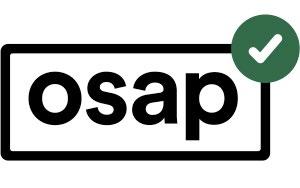
The Ontario Student Assistance Program (OSAP) is a financial aid program that can help you pay for college or university.
OSAP OFFERS FUNDING THROUGH:
› Grants: money you don’t have to pay back.
› Student loan: money you need to repay once you are no longer enrolled in your required course load.
When you apply for OSAP, you will automatically be considered for both grants and loans. If you don’t want to take a loan, you can decline it after your application is approved.
There are also programs to help you repay your student loan once you’re finished school.
HOW OSAP CAN HELP:
› OSAP helps students from lower and middle income families meet the costs of college.
› Provides financial assistance for educational costs and basic living expenses.
› Provides financial assistance for child care for students with children.
HOW DO I APPLY?
An online application means:
› Your application and the OSAP website is available online 24 hours a day, 7 days a week.
› It is quick and easy to use and your information is secure.
› Built-in prompts will help you avoid making entry errors.
› You can get an on-the-spot estimate of the amount of funding you may receive.
› There is no application fee.
The online OSAP application becomes available in May for the coming academic year.
Scholarship and Bursary Opportunities
Scholarships and bursaries are resources to help you finance your postsecondary education. Visit niagaracollege.ca/finaid
FINANCIAL AID AND AWARDS
Niagara College offers over $3 million in scholarships and bursaries each year for domestic students. Details on award opportunities are posted on our financial aid website.
Niagara College graduates succeed in our community thanks to support of our many donors and friends who recognize the importance of a Niagara College education.
FIND SCHOLARSHIPS ONLINE
Did you know that hundreds of scholarships through external organizations and companies can be found online? The following web resources are not affiliated with Niagara College, but do offer information regarding scholarship opportunities and additional financial aid information.
› scholartree.ca
› studentawards.com
› scholarshipscanada.com
Google “Canadian student scholarships’ – you’ll find many results online!
Financial Assistance for International Students
For details about scholarships specific to international students, please visit international.niagaracollege.ca/scholarships
niagaracollege.ca/residence
WELLAND CAMPUS
RESIDENCE:
905-732-9700 ext. 3800
Email: info.welland@niagararesidence.ca

NIAGARA-ON-THE-LAKE CAMPUS
RESIDENCE: 905-641-4435 ext. 3900
Email: info.notl@niagararesidence.ca
On-Campus & Off-Campus Living
Looking to extend your educational experience beyond the classroom while meeting new people, forming life-long friendships, and getting involved in everything NC offers?
From student leadership opportunities to experiencing a global community that connects you to students from all over the world, living in residence enables you to explore self-growth and development in a social and supportive community. You will be surrounded by residence advisors committed to helping you transition into your new accommodations.
Living in residence means you only pay for the academic year instead of a typical 12-month lease. Just steps from campus both residences offer furnished accommodations and multiple payment options. Amenities and occupancy within a student suite may vary depending on the location and room type you choose to apply for. Each furnished suite features two bedrooms, a kitchen (containing a fridge and microwave), a three-piece bathroom, and Wi-Fi Internet. Students supply linens, cutlery and small, CSA-approved appliances (e.g. a toaster or a kettle).
With controlled access and on-site management, entrances and common areas are monitored 24 hours a day, and visitors are required to sign in. Students living in residence will also have 24/7 access to a self-serve canteen or marketplace on the main floor with items for purchase.
Apply to Residence
You can apply online to live in residence. Applications for the Fall/Winter Academic Term open on February 1st. Applications received on or before April 15th will be included in the acceptance lottery; applications received after April 15th may receive acceptance into Residence or be placed on a first-come, first-served waiting list if rooms become available.
Following the acceptance lottery, acceptance packages will be sent via email within 3 business days of April 15th. Be sure to check your email including your junk folder frequently as email is NC’s preferred notification method. You are required to meet
all deadlines with both paperwork and payments. Please note: Ontario Student Assistance Program (OSAP) deferrals are not available.
Please see the Residence website: niagararesidence.ca for the current application process, payment dates/fees, and when the applications for the Spring and Winter Terms become available.
Off-Campus Housing
In addition to our on-campus Residences, the beautiful Niagara Region also offers plenty of affordable, safe, quality housing close to both Niagara College campuses. An online housing board is a convenient way to search for off-campus housing options including access to a large, real-time database of student housing vacancies. Many area residents offer accommodations with listings at places4students.com. Start searching as early as possible to find the best options for you.
Our International Housing and Settlement team also offers a wide variety of housing options for students transitioning to Canada to support their introduction to Canadian culture and the Niagara community. This includes assistance with residence, off-campus housing and Niagara College’s Homestay program. For more information, please visit: international.niagaracollege.ca/housing
Dining on Campus
NC Cafeterias feature freshly prepared food, ranging from salads to sushi to pizza. Meal plans are available, making it simple to pay for your food with the swipe of a card. Coffee and snack retailers and our student centres are available too: The Core in Welland or The Armoury in Niagara-on-the-Lake. Both locations offer casual dining and fun activities presented by the Student Administrative Council.
dineoncampus.ca/niagara yourncsac.ca
